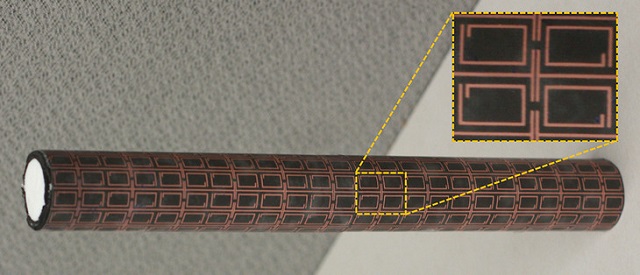 Antenna covered with copper patterned dielectric substrate creates a flexible metasurface that acts as an illusion coating, cloaking the antenna or making it appear to be something entirely different. Image: Zhihao Jiang/Penn State
Antenna covered with copper patterned dielectric substrate creates a flexible metasurface that acts as an illusion coating, cloaking the antenna or making it appear to be something entirely different. Image: Zhihao Jiang/Penn State
Electrical engineers at Penn State have developed an illusion coating that makes an object look like something else. They have reported this study in the scientific journal, Advanced Functional Materials.
Previous attempts at cloaking using a single metasurface layer were restricted to very small-sized objects. Also, the act of cloaking would prevent an enclosed antenna or sensor from communicating with the outside world.
Zhi Hao Jiang, postdoctoral fellow in electrical engineering, Penn State.
The newly developed thin metamaterial coating enabled normal functioning of the object while it was made to appear like some other object. The object could even disappear completely.
The "illusion /cloaking coatings" are two-dimensional, lightweight, flexible substrates that have specific copper patterns. When a sensor or an antenna or object was to be cloaked, the researchers covered the object with air or foam as a spacer. They designed the copper patterning for the specific wavelengths to be cloaked.
Then a very thin layer of the dielectric along with the copper patterning was applied. When a radio frequency source was used to probe this device, the scattering signature was that of the desired dielectric material. Further, specific pattern coatings could scatter electromagnetic waves in the same way as metal objects could.
The researchers employed standard lithographic methods and made geometric patterns of copper on the coating substrate. The illusion coating had to cater to the requirement of the specific application. This enabled the desired scattering signature to be emanated and the object appeared as something else.
Furthermore, this method provided a better angle-tolerant shield, and it could be adapted to function in the visible spectrum and in other electromagnetic spectrums. The ability of this method to shield materials could also be applied for protecting equipment from other electromagnetic interferences.
References